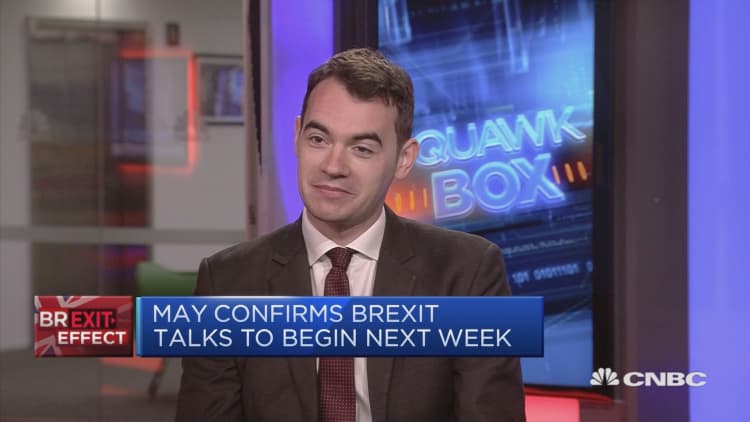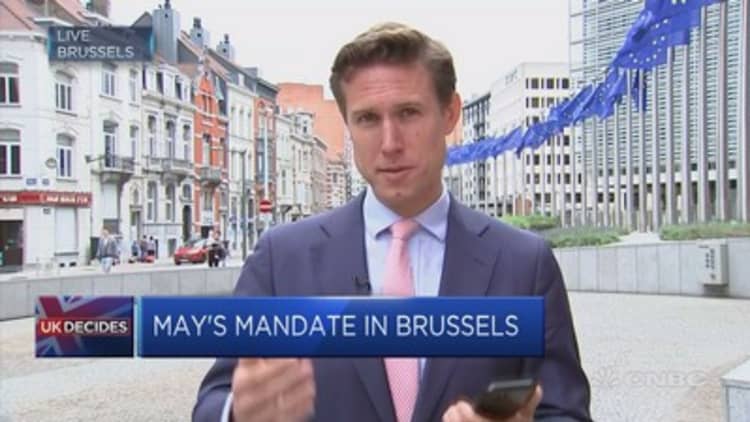Despite weathering a nasty political storm in recent months, U.K. leader Theresa May and her weakened government still has many market participants on edge, with the potential for another election still a distinct possibility.
According to Joan Hoey, the Economist Intelligence Unit's regional director for Europe, there is "considerable risk of the (U.K.'s) government collapsing." May's slender 13-seat majority, forged only through a compromising, expensive deal with the Democratic Unionist Party, could well "disappear quickly as a result of by-elections that will occur," Hoey explained.
The U.K. prime minister marked one year since she took the country's helm Thursday, while left-leaning opposition leader Jeremy Corbyn visited Brussels to meet with major European players in Brexit negotiations.
Adding to the jostle for power between the two politicians, a YouGov poll released last Friday denoted Corbyn with an eight point-lead over his rival May, rubbing salt into the wound of her loss of a government majority in last month's General Election. The shifting fortunes of the Labour and Conservative leaders have left voters – and investors – wondering when the U.K. will hold its next vote.

Despite the uncertainty, May underlined her resolve to lead the country in a speech Wednesday, saying that: "My commitment to change in Britain is undimmed … The determination I have to get to grips with the challenges posed by a changing world never more sure."
For some, the potential for a new election rests on party sentiment. Alex Greer, research and communications officer at thinktank Open Europe, told CNBC via telephone that "the only way this will come about is through political will." The future of the U.K. government is all about the prospect of a Conservative rebellion, he added. Another vote depends on whether Conservative Brexiteers and Remainers opt for either "forming a coherent majority or digging heels in over a matter of principle," Greer said.
Meanwhile, following Corbyn's trip to Brussels, shadow Brexit minister Keir Starmer tweeted that "constructive discussions" had taken place. "Corbyn is trying to show that he's a prime minister in waiting," Hoey said. Despite a surge in momentum following an unexpectedly positive General Election result, Hoey warned that Corbyn is still "walking a tightrope within his own party," due to varying degrees of pro-EU sentiment.

Theresa May's lasting power in Number 10 may rest on her vow to deliver Brexit, a process which itself has a two year allotted timeframe. Some analysts CNBC spoke to pointed out that sentiment to boot May out of her leadership position was at its peak immediately after the election but has since waned. The Conservative party also has no obvious leader-in-waiting.
The U.K. economy has surprised onlookers with its initial buoyance following the shock vote to leave the EU in June 2016. But, economic storm clouds are gathering on the horizon. Data out last week revealed that the country's trade deficit widened by £2 billion in the 3 months to May 2017, part of which was due to a decrease in exports of services. Construction and industrial output also contracted.
With regards as to what a fresh vote could mean for investors, David Lea of consulting firm Control Risks said that a fresh vote would be "pretty bad news (for investors) as it underlines the instability the U.K. is suffering from."
"Business would start looking at the U.K. and question if it was rock solid," he added.




